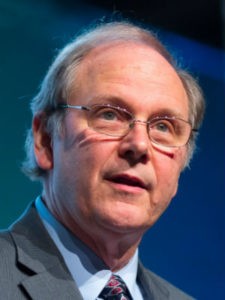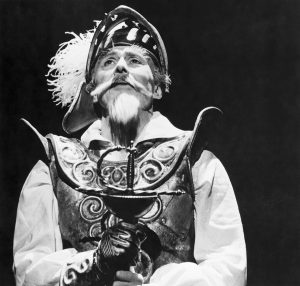The 2001 song “I Can Only Imagine” was written by Bart Millard and recorded by the Christian band MercyMe. Based on an imaginary experience in heaven, the lyrics include:
I can only imagine what it will be like
When I walk by your side.
Surrounded by your glory
What will my heart feel?
Will I dance for you, Jesus,
Or in awe of you be still?
These lyrics that focus on an interpretation of heaven illustrate a prominent characteristic of much contemporary Christianity. They emphasize the spiritual, personal and heavenly and dream of what can only be imagined — the “then-ness” of the Christian afterlife.

Robert Sellers
While this gospel song is admired by many Christians, it does not appeal to everyone. Religion that is more focused on praise than provocation, on jubilation for the elect rather than justice for all, on the future instead of the present — this kind of faith turns many people, especially the young, away from organized religion.
I suggest an earlier composition honors Jesus more, although it wasn’t written for that purpose. It is “Imagine,” the 1971 lyric by the Beatles’ John Lennon, which is one of the most frequently performed songs of the 20th century.
Unlike “I Can Only Imagine,” this song stresses what could be experienced before one’s death, visualizing the “now-ness” of this life. It focuses on the this-worldly rather than the other-worldly and thus appeals to a different group of Christians, many of whom have left the church but do not deny their spiritual selves.
Imagine there’s no heaven,
It’s easy if you try.
No hell below us,
Above us only sky.
Imagine there’s no countries,
It isn’t hard to do.
Nothing to kill or die for,
And no religion too.
Imagine no possessions,
I wonder if you can.
No need for greed or hunger,
A brotherhood of man.
I hope someday you’ll join us.
And the world will be as one.
“Imagine” envisions a world without conflict, war, greed, consumerism, national borders and divisive religions. Remembering these lyrics is not just a nostalgic celebration of one of the most popular songs of the past but a hopeful statement of what the future could be.
“When Christians challenge the harsh here and now rather than savor the sweet by and by, they are imagining in a way that reflects the life of Jesus.”
When Christians challenge the harsh here and now rather than savor the sweet by and by, they are imagining in a way that reflects the life of Jesus. God is more pleased when we wonder about how we might end white nationalism, racial injustice, hatred and conflict, the growing gap between rich and poor, injustice toward the marginalized, climate change and destructive storms, global hunger, pandemic disease and other hellish realities surrounding us than when we simply gaze lovingly at Jesus, fall to our knees in awe or dance in joyous exuberance and worship.
Imagination as creative awareness of God
What is imagination? The Oxford Languages dictionary defines it as “the faculty or action of forming new ideas … of external objects not present to the senses,” or “the ability of the mind to be creative or resourceful.”
Three global Christians comment on the religious implications of imagination.
American feminist theologian Carter Heyward says, “Imagination is first a recognition that there is more going on than we can realize. … Imagination is our primary resource for knowing more than we think we can — about Jesus and with him.”
Samir Selmanovic, the Croatian pastor of Faith House Manhattan, an interfaith worship center in New York City, writes: “All of our knowledge about God is inevitably contingent on our imagination, just as all the ethics of the religious texts are contingent on the ethics of the interpreter of the text. And certainly, in a world where God management systems often manage our imagination, imagining a different kind of God is an act of resistance and hope.”
Susan Burt, a Christian educator from Australia, stresses that “imagination is the essential means, humanly speaking, by which faith becomes possible.” To illustrate her point, Burt points to the Syrophoenician woman (Mark 7:24-30), whom she says “dared to imagine (or) re-vision God’s way beyond cultural and religious boundaries. She erases the lines and gives rise to the questions already there, wins liberation for her daughter, and builds” a new world for them both.
If imagination, then, is not only the ability to form new, creative ideas, but also our primary resource for knowing more about Jesus and with him than we think we can, the basis for how we talk about a different kind of God with resistance and hope, and the act which potentially brings liberation for others and builds a new world, then why don’t we use our imagination more often?
Imagination as the audacity to risk
Perhaps we don’t because it is risky to imagine things that are not popular, conventional or acceptable in polite, orthodox religious society. There is nothing to fear if one uses imagination in the context of an approving Christian audience — to envision a moment in eternity standing before God’s throne singing hallelujahs to the king. But there can be dangerous consequences if a person uses imagination to envision how the powers of government, commerce and organized religion can be challenged.
“There can be dangerous consequences if a person uses imagination to envision how the powers of government, commerce and organized religion can be challenged.”
In December 1980, John Lennon was returning to his New York apartment with his wife, Yoko Ono, when 24-year-old Mark David Chapman shot the 40-year-old music icon four times in the back. Chapman, who recently had a religious conversion experience, was angry about Lennon’s song, “Imagine.” According to Newsweek, “religion and belief (were) the motive behind the murder.”
Walter Brueggemann, in The Prophetic Imagination, suggests perilous, audacious imagination characterized both Moses and Jesus: “Moses introduced (in Egypt) not just the new free God and not just a message of social liberation. Rather, his work came precisely at the (intersection) of the religion of God’s freedom with the politics of human justice.” As a consequence, Pharaoh and his armies pursued Moses and the people in order to annihilate them.
Similarly, says Brueggemann, “The coming of Jesus meant the abrupt end of things as they were. … In Mark 1:15 he announces the coming of the kingdom. … In Luke 4:18-19 he announces that a new age was beginning.”
Brueggemann summarizes: “The ministry of Jesus is, of course, criticism that leads to radical dismantling. And … the guardians and profiteers of the present stability are acutely sensitive to any change that may question or challenge the present arrangement. … This is the problem with the … newness of the gospel: it never promises without threatening, it never begins without ending something, it never gives gifts without also assessing harsh costs.”
Accordingly, Jesus was crucified.
Holy imagination is still revealed in the words and actions of courageous change agents. Likewise, “the guardians and profiteers of the present stability” continue to kill the prophets and stone those sent to it, just as Jesus described in Luke 13:34.
“Holy imagination is still revealed in the words and actions of courageous change agents.”
It is not surprising, then, that an assassin’s bullet took the life of Robert Kennedy, who challenged a whole nation with his words, “There are those that look at things the way they are, and ask, ‘Why?’ I dream of things that never were, and ask, ‘Why not?’”
Or that Martin Luther King — who dreamed that “one day this nation (would) rise up and live out the true meaning of its creed ‘that all … are created equal’” — did not live to celebrate his 40th birthday.
Kennedy and King, both murdered in 1968, were imaginative persons on a dangerous quest.

Richard Kiley, as Don Quixote in a touring company of “Man of La Mancha.” (Getty Images)
The kind of vision that animated their lives was portrayed just three years before their deaths in the words of the most popular song of the 1965 Broadway musical Man of La Mancha — “The Impossible Dream.” The song was sung by Don Quixote as he stood guarding his armor and talking to the peasant woman Dulcinea, who had inquired what it meant to “follow his quest.” Later, in a final reprise, prisoners in a dungeon sang the song as Quixote and his manservant, Sancho, climbed the staircase to face death from Spanish inquisitioners.
Imagination as foolishness for God and others
The words of “The Impossible Dream” are stirring, but in the context of the play, they are the ramblings of a mad man. And perhaps that indictment hints at a third thing to say about holy imagination, namely, that it can cause people to act foolishly for the sake of others.
“Holy imagination can cause people to act foolishly for the sake of others.”
Such behavior is associated with being “fools for Christ” (1 Corinthians 4:10), which is why some in Christian history have been called “holy fools.” Simeon the Holy Fool was a sixth-century Syrian monk and hermit considered to be crazy, but who healed possessed people, fed the hungry and helped the needy. Basil the Blessed, or Basil the Fool for Christ, was a 16th-century Russian shoemaker who walked around naked, weighted down with chains, but who gave to the poor and shamed the miserly. Ivan the Terrible was so impressed that he served as the fool’s pallbearer in Moscow’s Cathedral of the Intercession, now popularly known as St. Basil’s Cathedral.
More famous was St. Francis of Assisi, the 13th-century Italian son of privilege who left his worldly life to wander about embracing lepers, preaching to the birds and beasts and repairing crumbling church buildings.
And there was the 20th-century Albanian, Mother Teresa, who foolishly left the safe, conventional nun’s life as a school teacher to rescue and embrace the diseased and dying from the streets of Calcutta.
How to live
I wish we might become Christ-followers who are imaginative. But let us set aside thoughts of an eternity praising God and use our remaining years on earth attempting risky ways to help others. May we creatively resist evil and unite in building a new world of hope for all God’s children. Let us dream the impossible dream as we joust with the windmills that blow storms across our path. May we become holy fools whom others may criticize but God will honor.
And if we truly do these things, perhaps the church will not seem irrelevant to so many of our neighbors, especially the young. If we begin to use our holy imagination, what could be the result?
I can only imagine!
Rob Sellers is professor of theology and missions emeritus at Hardin-Simmons University’s Logsdon Seminary in Abilene, Texas. He is a past chair of the board of the Parliament of the World’s Religions in Chicago. He and his wife, Janie, served a quarter century as missionary teachers in Indonesia. They have two children and five grandchildren.


